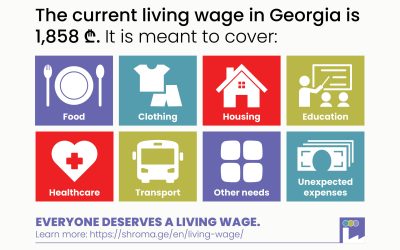On February 19, the Health Care and Social Issues Committee of Parliament announced its support for proposed legislation to raise Georgia’s minimum wage. The proposed bill was submitted by the Georgian Trade Union Confederation (GTUC) and envisions setting Georgia’s minimum wage at 40% of the average (mean) salary. According to 2022 data, this would work out to 636 GEL per month.
The Committee supported the legislative proposal based on the recommendation of the Ministries of Labor, Health and Social Affairs and Economy and of Sustainable Development, with the reservation that it should be submitted to the Tripartite Social Partnership Commission and discussed prior to enactment.
The Tripartite Social Partnership Commission is a deliberative body whose membership includes the government of Georgia, employers’ associations and trade unions. However, the Commission does not include a number of sectoral trade unions with significant experience in labor rights and social policy issues.
Government action on the minimum wage – which has not been updated since 1999 – is long overdue. Under Georgia’s 2019-2023 strategy and action plan on labor and employment policy, the Commission was supposed to study the economic feasibility of a new minimum wage in 2023 but failed to do so. According to a media report, the Union of Trade Unions raised the issue of the minimum wage to the Commission several times, but it was not taken up.
Further, it is worth noting that in 2019, MP Beka Natsvlishvili submitted legislation to Parliament in cooperation with various independent trade unions (Solidarity Network, Ertoba 2013, the Social Workerss Union and Sazmau Trade Union), which would have increased the minimum wage to 45% of the average salary (492 GEL at the time). In October of the same year, GTUC presented an initiative to Parliament that proposed 320 GEL as the minimum wage. Neither of these legislative proposals gained support in Parliament.
The lack of decent wages is one of the most acute social problems in Georgia today. The official minimum wage for the private sector in Georgia is 20 GEL, which has not been revised since 1999. A significant number of people earn wages below the subsistence minimum, which means they do not earn enough for to cover their basic needs. In recent years, workers’ demands for decent wages have grown louder and louder.
It is clear that Georgia desperately needs to update the minimum wage. But it is critical that the new minimum wage – and the process used to create it – complies with international human rights law and responds to the real needs of Georgian workers.
International human rights law is clear that Georgia must set its minimum wage at a level that allows workers to afford a “decent living.” This means that any methodology used to set the wage must look at more than basic subsistence needs. It must consider workers’ social welfare, including social security, health, education, participation in cultural and social activities and more. This is why the Fair Labor Platform has long advocated that all workers should be paid a living wage that covers expenses such as food, clothing, housing, education, health care, transportation and other elements of a decent living.
It should also be noted that according to the European Union’s minimum wage directive, the minimum wages of member states should be set at 50% of the average (mean) wage or 60% of the median wage. The current minimum wage proposal falls short of this benchmark.
Finally, we believe that the debate over Georgia’s minimum wage is a critically important one which should include the widest possible participation from all stakeholders. This means that consultations must stretch beyond the Tripartite Social Partnership Commission. Self-organized groups of workers, sectoral trade unions, civil society organizations working on labor rights and representatives of the academic field should all be given the opportunity to contribute to this process as well.



